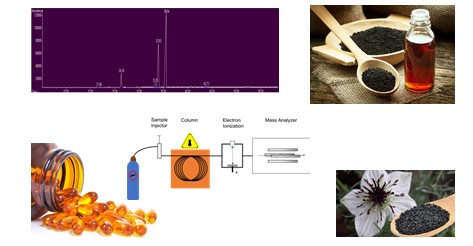JOURNAL 1385
Journal of Chemical Metrology
Year: 2019 Issue: 2 July-December
p.53 - 60
Viewed 3855 times.
GRAPHICAL ABSTRACT

ABSTRACT
MMedicinal and aromatic plants are widely used around the world. Today, Black cumin (Nigella sativa L.), one of the most popular medicinal plants, offers numerous benefits for human health. Black cumin oil has known to be used for the treatment of asthma, hypertension, cancer, rheumatism, and headaches over the course of many years. In this study, ten different black cumin seed oils and seed oil capsules, which have been obtained from local markets in Turkey, were investigated for their fatty acid profiles as percentages via gas chromatography and mass spectroscopy (GC-MS). According to the results obtained, the major fatty acids found in capsules and oil samples were similar with small differences in terms of amount; linoleic, oleic and palmitic acids were found as major compounds; 35.27-58.15%, 25.06-51.83%, 7.29-12.88 % in oil samples; 36.67-56.61%, 24.93-46.71%, and 7.90-12.71% in seed oils capsule samples, respectively. This is the first study determining the fatty acid percentages of commercial black cumin seed oil and seed oil capsules.
KEYWORDS- Nigella sativa L.
- black cumin
- fatty acid profile
- seed oil
- seed oil capsule
- GC/MS